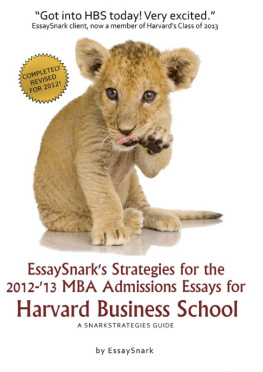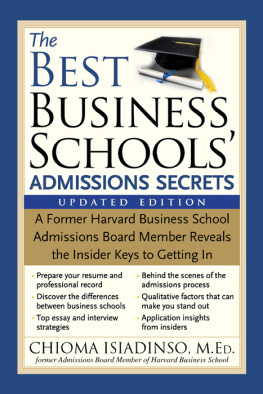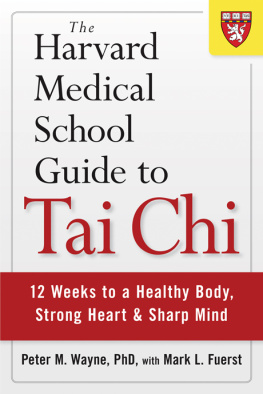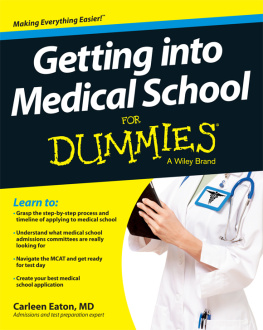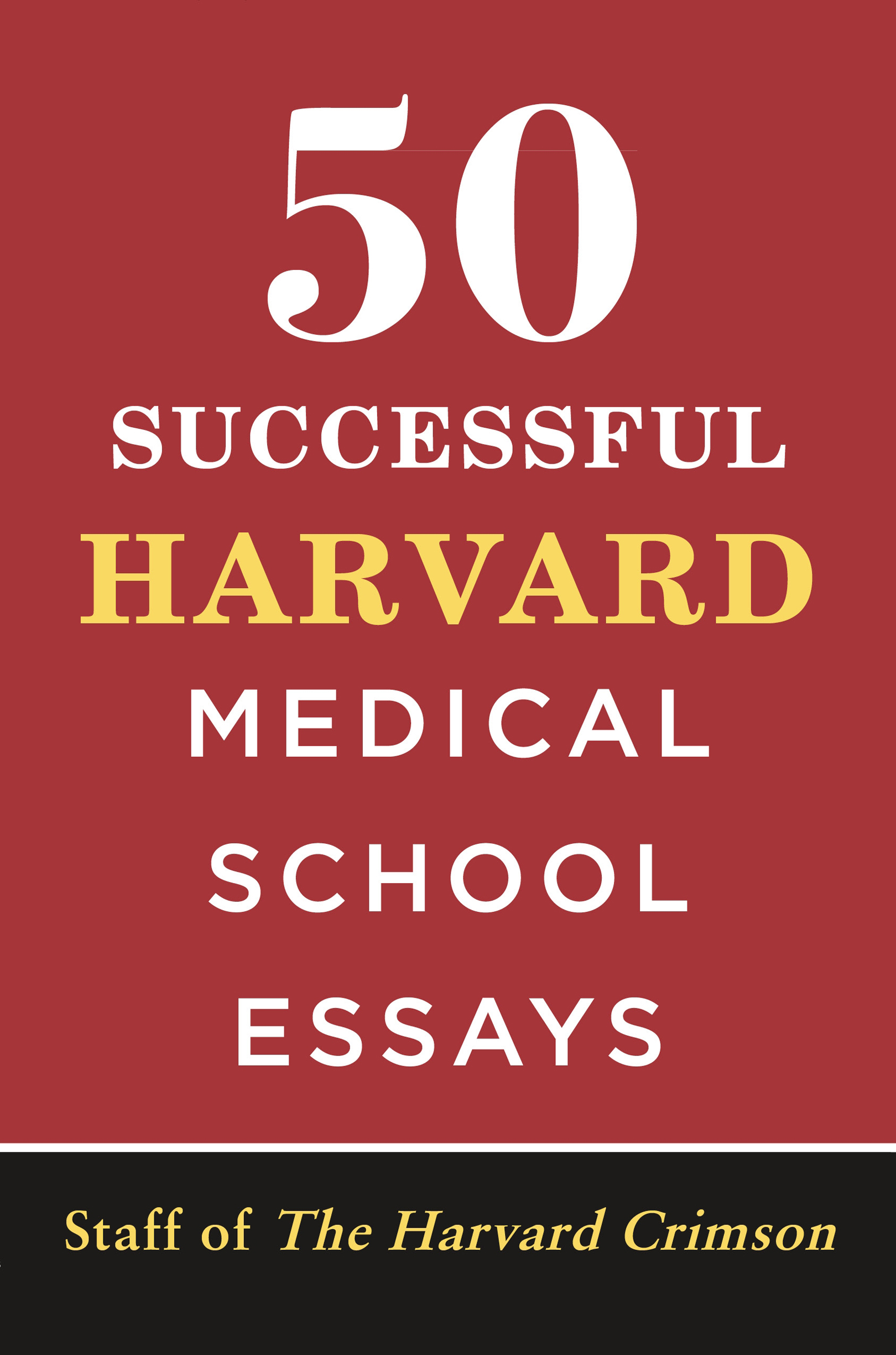I would first like to thank our amazing editors at St. Martins Press, Laura Apperson and Sallie Lotz, for believing in the first book of this new series and for providing us with endless support and guidance as we compiled the book. I would also like to express my sincerest gratitude to the fifty contributing medical students. Thank you for sharing your stories and wisdom with aspiring students all around the world; this book would not be possible without your commitment and dedication to supporting the next generation of doctors. Last but certainly not least, thank you to members of the Crimson staff whose perseverance and passion for this book made it a success. In no particular order, thank you to Katharina Wolf, Owen Searle, George Moe, Melissa Du, Evelyn Manyatta, Deni Hoxha, and Rebecca Lisk. We did it.
Sabrina W. Chok
Publishing Manager,
146th Guard of The Harvard Crimson
Competition for admittance into the nations top medical schools has never been more intense and it has become increasingly important to write a personal statement that sets you apart from thousands of other medical school applicants.
However, that is a daunting taskin less than fifty-three hundred characters, you must weave together your experiences, interests, and passions into a memorable and evocative narrative that resonates with a panel of admissions officers. While there is no magic formula for writing the perfect essay, by picking up this helpful book you are already on the right track. Whether you are just beginning to write your essay or have written several drafts already, this book will provide you with the insights and guidance you need to succeed.
On these next pages, you will find fifty standout essays that helped students successfully secure a spot at Harvard Medical School, one of the best medical schools in the country. No two essays are the same: A young woman describes creating mental health awareness in her community. A hockey player opens up about their unexpected entrance into sports medicine. A pianist explores the intersection between music and care. Each student presents a different set of experiences, ideas, and perspectives that informs their path to medicine.
Each essay is coupled with analysis by a Crimson editor or editors on specific essay qualities and techniques that worked, so you can learn from their example and apply it to your own writing. You will find that for many of these essays, their strengths lie not in the writers topic of choice, but instead, in the writers ability to forward an argument about their character, drive, and passion for medicine with elegant prose, precise organization, and sometimes even a sprinkle of unexpectedly charming humor.
We have divided the book into five thematic categories: Passion, Influential Figure, Impactful Experience, Identity, and Intellectual Desire. While these broad themes by no means fully encapsulate the complexity and depth of each of these essays, we hope they will serve as helpful guiding points as you pinpoint the types of stories you want to tell. At the end of this book, you will find a chapter filled with words of wisdom from some of the students behind these essays. We hope their words will encourage and guide you as you embark on this journey.
We wish you the best of luck with writing your essay and finding the medical school that is right for you.
Sabrina W. Chok
Publishing Manager,
146th Guard of The Harvard Crimson
Hometown: Nanjing, China
Undergraduate School: Private, Williams College
Major: Biology
GPA: 3.86
MCAT: 36. PS: 10, V: 14, BS: 12.
ESSAY
Detention. The word filled me with youthful indignation. I knew I was being punished for tasting the alkali earth metal salts we were categorizing in the science lab, but from my 12-year-olds perspective, I was in legendary company. My hero, Dr. Shizhen Li, the 16th century Chinese herbalist from my history books, had famously risked his own health to locate and sample the thousands of medicines he exhaustively researched for his Compendium of Materia Medica. Though the punishment tempered my reckless tasting of lab materials, it failed to restrain my adventurous spirit. Like the relentless Dr. Li, my aspirations to become a physician-scientist have spanned the globe and led to unexpected journeys.
In my early years, two very important women inspired me to carefully question conventional wisdom. My grandmother was obsessed with the medicinal properties of food. Diagnosed with severe diabetes in her 70s, she ignored her physicians advice to begin insulin shots and successfully controlled her condition with diet and exercise. As a child, I eagerly followed her maverick example. I must have seemed an earnest little quack, prescribing all kinds of foods to cure my friends ailments. But it wasnt simply play. I still find myself resorting to some of my grandmothers herbal solutions. I even converted my undergraduate thesis advisor into the habit of drinking Chinese Tieguanyin tea to fight his Coca-Cola addiction.
My close relationship with my grandmother prompted an early interest in nutrition and natural remedies. But it was my admiration for my mothers work as a leading HIV/STD epidemiologist for Chinas CDC that introduced me to the essential roles of public outreach and research in battling diseases. As a teen, I took on the tasks of performing simple data analysis in my mothers lab and distributing handouts from the CDC detailing STD support resources in clinics. I particularly enjoyed face-to-face interaction with patients, and was intrigued by the close collaboration between doctors and epidemiologists. Moreover, I began to understand the stake we have in overcoming cultural taboos in order to prevent, detect and treat infectious diseases. Talking with young AIDS patients fighting uphill battles, I realized I didnt have the patience to wait until I received a physicians license to spread the gospel of preventive care. I felt compelled to act.
Recognizing that a Chinese medical education would focus almost exclusively on the hard sciences, I decided to instead pursue a US liberal arts education despite considerable obstacles. I yearned for the freedom to engage with the public to promote disease prevention and explore the diversity of factors affecting health. Williams College offered me the opportunity to connect my passion for medical science with my concern for the community through the student organization Public Health Alliance. First as a participant, and then as Chair, I worked with campus and community leaders to raise awareness of preventable and sometimes controversial health issues since my sophomore yearranging from sports injuries to HPV awarenessfacing the Williams community. My undergraduate years also sparked my love for the interdisciplinary nature of neuroscience and deepened my interest in research. Rewarding laboratory experience, clinical shadowing, and mentorship from physician-scientists reinforced my aspiration to work at the exciting interface between brain research and medicine.


